Unit 2 Teams Lesson 6 A Special Team Warm-up Reading 课件(共55张PPT)
文档属性
| 名称 | Unit 2 Teams Lesson 6 A Special Team Warm-up Reading 课件(共55张PPT) |

|
|
| 格式 | zip | ||
| 文件大小 | 1.1MB | ||
| 资源类型 | 教案 | ||
| 版本资源 | 北师大版 | ||
| 科目 | 英语 | ||
| 更新时间 | 2018-11-12 18:40:09 | ||
图片预览

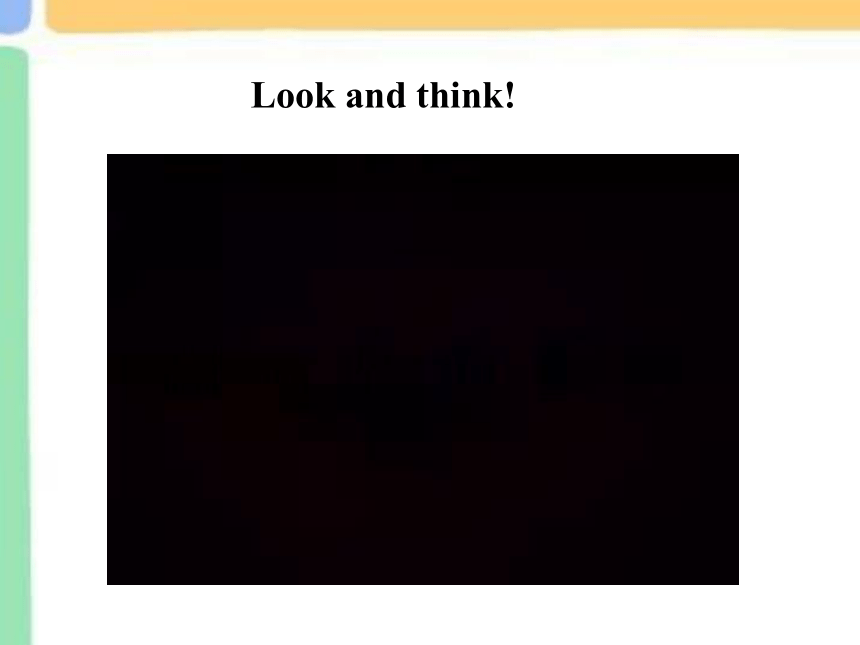
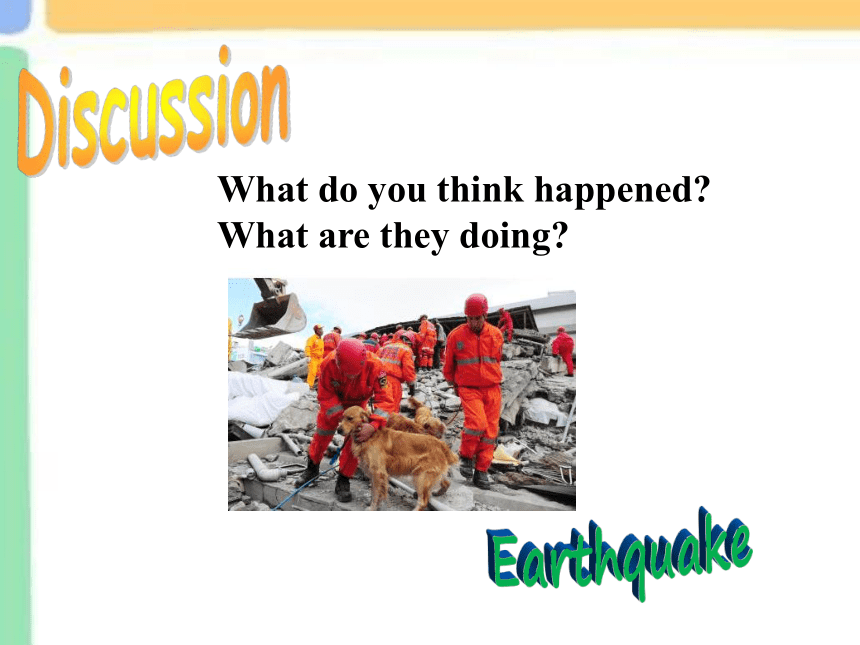
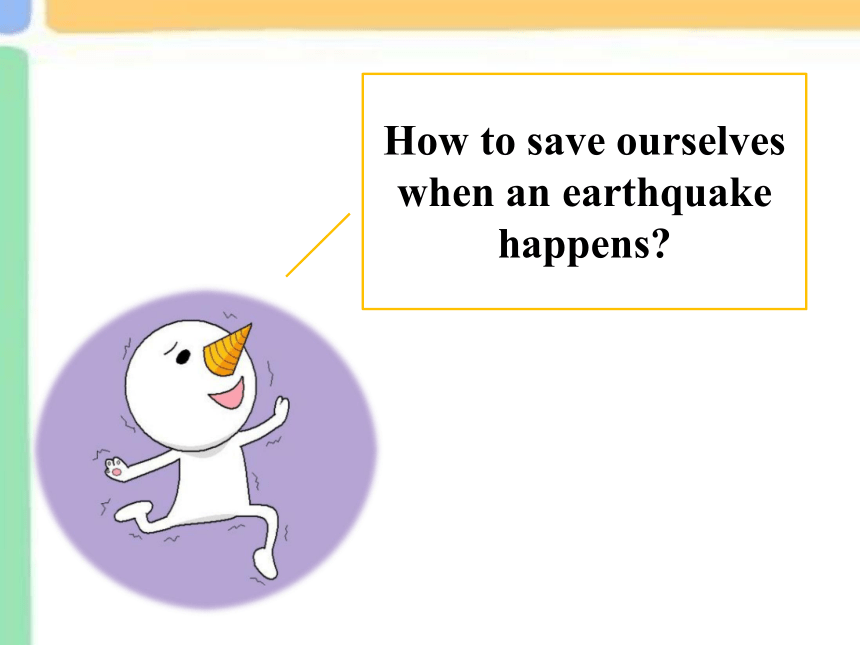
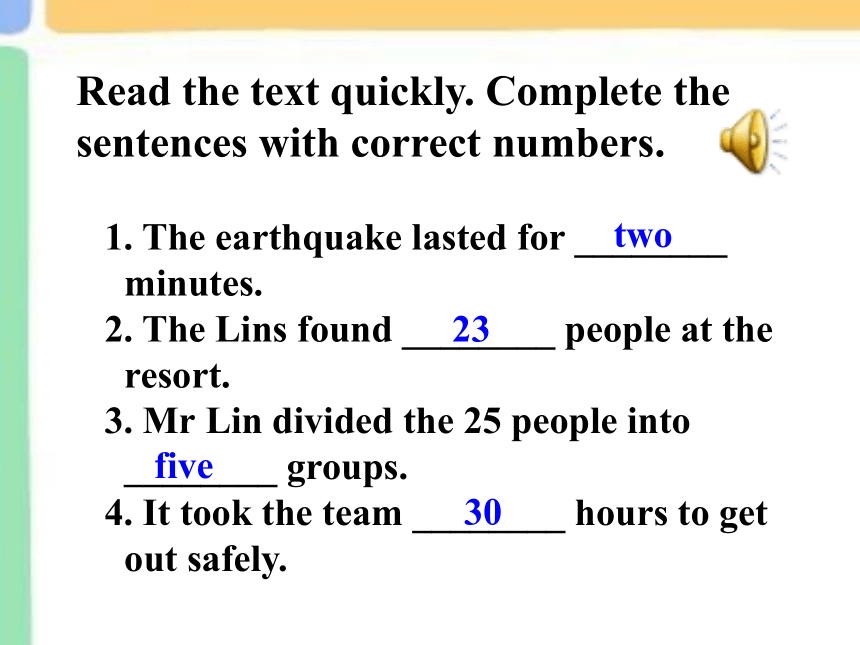
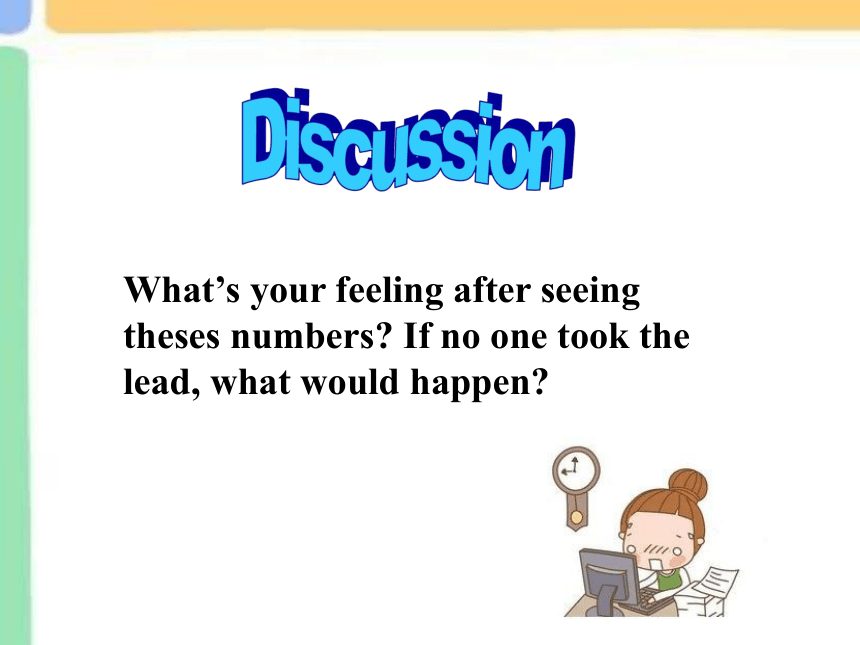


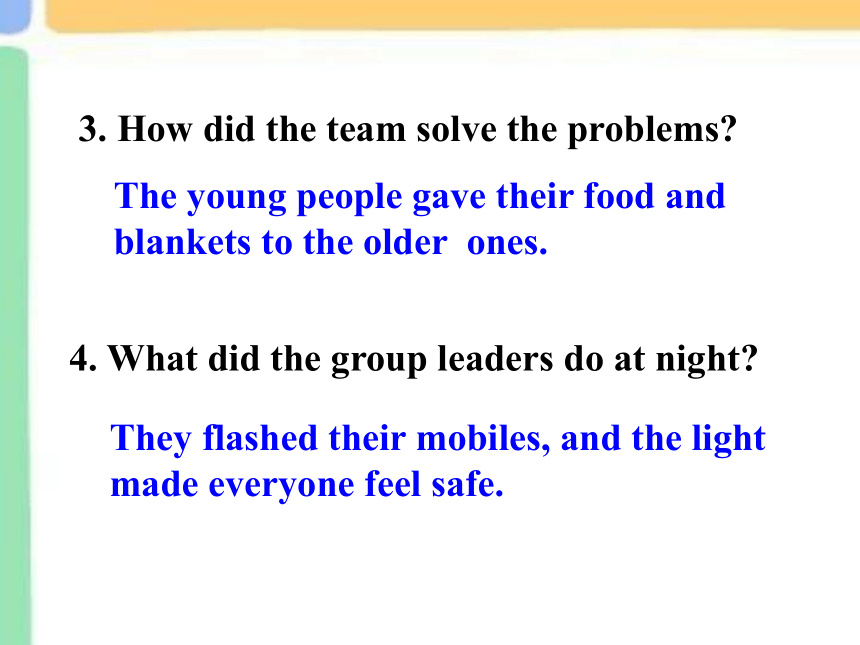



文档简介
课件55张PPT。Unit 2Warm-up & ReadingLesson 6Look and think!What do you think happened?
What are they doing?Earthquake How to save ourselves when an earthquake happens?Read the text quickly. Complete the sentences with correct numbers.
1. The earthquake lasted for ________ minutes.
2. The Lins found ________ people at the resort.
3. Mr Lin divided the 25 people into ________ groups.
4. It took the team ________ hours to get out safely.two23five30What’s your feeling after seeing
theses numbers? If no one took the
lead, what would happen?Read the text again and do true or false.
1. When the earthquake happened, the night was coming.
2. The earthquake was short but strong.
3. They went down the mountain right after the earthquake.
4. Everyone flashed their mobile phones every 30 minutes.
5. It took them 12 hours to walk.TFFFTRead the text again and answer questions.
1. Why didn’t the group go down the mountain right after the earthquake?
2. What problems did the group have?The roads are too dangerous.They didn’t have enough food and blankets. 3. How did the team solve the problems?
4. What did the group leaders do at night?They flashed their mobiles, and the light
made everyone feel safe.The young people gave their food and blankets to the older ones. What can you learn from this team?Discussion Language points1. The old couple was on holiday at a
mountain resort. on holiday = on vacation
在休假中; 在度假
She’s on holiday; she needs a change from work.??
她正在度假,她需要放下工作改变一下生活。
We’re going on holiday soon, probably next month.??
我们很快就要去度假了,多半是下个月。— Where did you go _____ holiday last year?
— I went to the zoo to see animals. They were cute.
A. at B. for C. on D. with C2. They were taking a walk in the early afternoon, when suddenly the ground started to shake. take a walk 散步
Taking a walk is good for you.
散步对你有好处。
She used to take a walk after supper.
她过去常在晚饭后散步。
每天晚餐后我通常和妈妈去散步。
I usually ____ ___ _____ with my mum after supper every day.
After dinner he often ________ in the park.
A. take a walking
B. take a walk
C. taking a walk
D. takes a walktake a walkD【知识链接】
take a look (at) = have a look (at) 看一看
take pictures 照相
take a seat = have a seat 坐下
take a rest = have a rest 休息一下
shake意为“震动;摇动;握手”,既可作不及物动词,也可作及物动词。如:
Shake the bottle before pouring the juice.
倒果汁前,先把瓶子摇一下。
He shook his head in disapproval.
他摇了摇头表示反对。 His voice shook with fear.
他害怕得声音发抖。
She reached out her hand and offered to shake his.
她伸了手去,想和他握手。
When people meet, they shake hands as a token of friendship.
人们相逢的时候,握手以表示友谊. shake的过去式是shook【拓展】
shaking也意为“震动;摇动”,它是动词shake的名词形式。如:
At first, I felt a slight shaking through
my body.
起初,我感到一阵轻微的晃动掠过我
的身体。根据句意,用括号中所给单词的正确形式填空,每空一词。 1. Look out! Can you feel something _______ (shake) in the room? 2. I saw the desk _______ (shake). What happened? 3. Yesterday the wall __________ (shake) for about two minutes and then fell down.shakingshakeshookPractice3. One by one, they found 23 other people.
one by one “逐个地,一个接一个地”,强调次序
Please retell the story one by one.
一个接一个地复述故事。
Let’s get on the bus one by one.??
让我们一个一个地上车吧。
one after another 强调一个接一个接连不断
They left the room one after another.
他们一个个地离开了房间。
We achieved victories one after another.
我们取得了一个又一个的胜利。【拓展】1. 大家一个个按顺序过桥吧。
Let’s cross the bridge one by one.
2. 他们一个接着一个走进房间。
They came into the room one by one.
3. 我看见汽车一辆接着一辆开过去。
I saw cars driving by one after another.翻译句子。year by year 通常用作状语,且含有逐渐(gradually)转变的意思。
year after year 可用作状语,有时也可用作主语或宾语,它通常暗示时间之长久(for many years)。
He sent money year after year to help the poor.
他年年送钱帮助穷人。
Prices tend to rise year by year.
物价总是一年一年地往上涨。【知识链接】4. Some lost their hope. lost 是 lose 的过去式
lose v. 丢失,迷失;失败;错过
I lost my wallet yesterday.
我昨天丢了钱包。
The team played well, but lost the game.
这个球队打得不错,但还是输了这场比赛。
Hurry up or we will lose the train.
快点,要不就赶不上火车了。常用短语lose one’s life 丧生
lose one’s way 迷路
lose oneself in 沉湎于……
lose weight 减肥
lose face 丢脸
lose heart 泄气,灰心
lose your mind 丧失理智
lose touch with sb. 和某人失去联系 lost adj. 丢失的,迷路的
He is hunting for his lost book.
他正在寻找一本丢失的书。
The girls were lost in the music.
那些女孩子完全沉浸在音乐中了。
loss n. 失去
I regret the loss of her friendship.
我为失去她的友谊而遗憾。【拓展】选用lose, lost, loss填空:
1.?He __________ his job.
2.?She has ________ interest in her work.
3.?He _________ his way in the snowstorm.
4.?You cannot __________ yourself in computer games.
5.?He reported the _________ of his wallet to the police.
6. The fat boy wanted to _________ weight.
lostlostlostloselosslose5. At that moment, Mr Lin decided to take the lead.at that moment = at?that?time
? 在那时(常用于过去时)
What?thought?in?your?mind?at?that?
moment?
那时你在想什么?
Just at that moment, the door opened and the teacher walked in.
就在那时,门打开了,老师走进来。
I don’t think Jim saw me. He _______
a book at that moment.
A. just read B. has just read
C. was just reading D. had just read
C【拓展】at the moment = right now “此时此刻”,用于现在时。
I’m?busy?at?the?moment.????
我此刻很忙。
in a moment = very soon“很快,立即”,一般用于将来时的句子。
He’ll be back in a moment.??
他马上就会回来的。
for a moment “一会儿”表示时间的延续。
Hold on for a moment.
请稍候。1. A woman with two children ______ alone the street at the moment.
A. is walking B. are walking
C. walk D. walks
2. — _______ you _______ TV at the
moment?
— No, you can turn it off.
A. Did; watch B. Are; watching
C. Do; watch D. Have; watched
3. I’m busy ____.
A. at the moment B. at that moment
C. in a moment D. just a moment ABA decide v. 决定;判断;断定
It’s difficult to decide between the two.
对这两者,不易做出抉择。
It is for you to decide.
由你来决定。
I can’t decide the date of the meeting.
我决定不了这次会议的日期
decision ? n. 决定???
make a decision? 做决定
come to a decision = arrive at a decision?
作出决定decide to do sth. = make up one’s mind to do sth.? 决定做……
He has decided to go abroad.
他已决意出国。
decide on sth. / sb.? 决定某事/某人
I decided on spending the vacation by the sea.
我决定在海边度假。
He has decided on a new car.
他选定了一辆新车。【拓展】?Finally,?she?decided?____?study?in?Xijin?
Middle?School. A.?to????????B.?on?????????C.?for
They decide on the best place ____ lunch.
A. have B. having
C. to have D. hasAC1. Mike made a _____________(decide)
to travel to France?for holiday.
2. It is a clever _________ that they will
put off the meeting till the day after
tomorrow. (decide)
3. I can’t decide which sweater
___________. (choose)
4. I decide __________ (go) there with
him. decisiondecisionto chooseto go take the lead 引导; 带头; 做榜样
He took the lead after the first hour of the race.
在赛跑开始后一个小时,他便取得了领先位置。
Now everybody sings! I’ll take the lead.
现在大家唱歌,我起头。
6. He called for everyone’s attention.call for one’s attention 让……注意call one’s attention to
叫某人注意……
pay attention to
注意……
attract / catch / draw one’s attention
引起某人注意
bring to one’s attention
……引起某人的注意call at a place 到某地拜访
call (up) on sb. 拜访或看望某人
call away 叫走;转移(注意力等)
call back 唤回,叫回;回电话
call in 请进;请来;来访
call off 叫走,转移开;取消
call out 大声叫(喊)
call up (给……)打电话;想起,回忆起【拓展】 form v. 组成;产生;组织
The children formed a circle round her.
孩子们在她周围围成了一个圈。
A plan began to form in his head.
一项计划在他脑子中形成。
He determined to form a club.
他决心成立一个俱乐部。【拓展】7. We can’t go down the mountain until tomorrow. until prep. & conj. 直到
I watched TV until she came back.
我看电视一直看到她回来。
... not ... until ... ……到……时候才……
You mustn’t eat anything until you see the doctor.
看过医生之后,你才能吃东西。
Don’t get off the bus until it has stopped.
车停了以后再下车。8. … went to the ruins to look for food
and blankets. look for 寻找
What are you looking for?
你在找什么?
She is the one we are looking for.??
她就是我们要找的人。find & look for & find outfind是look for的结果
Have you found your pen?
你找到你的钢笔了吗?
look for是find之前的寻找过程
What are you looking for?
你在找什么?
find out指经过一番努力最终找到
I found out she was wrong.
我发现她错了。1. 最后,我在床底下找到了那本书。
I _______________ under the bed in the end.
2. 我爸爸正到处找他的护照。
My father _____________ his passport
everywhere.
3. 我们必须查明真相。
We must ________________. found that bookfind out the truth is looking for— What?are?you?doing? — I?am _____ my?watch. Can?you ____ it? A. looking?for; find B. finding;?find C. looking; find?out D. finding?out;?lookA9. … not enough for everyone. enough adj. 充足的;足够的
I haven’t enough time for reading.
我没有足够的时间读书。
注意:用作形容词在句中可作定语或表语。作定语时,它的位置较灵活,既可放在所修饰词前,也可放在所修饰词后。例如:
I haven’t time enough for reading.
我没有足够的时间读书。 enough adv. 充足地,足够地
He is brave enough to face dangers.
他很勇敢,足以面对各种危险。
He plays well?enough?for a beginner. ??
对于初学者来说,他弹奏得相当不错。
注意:用作副词修饰形容词、副词或动词,位于所修饰词之后。【拓展】1) He ran and ran, but he couldn’t run _____ to catch the bus.
A. fast enough B. enough quick
C. enough fast D. enough quickly
2) Mike is only 15 years old. He is not ______ to get a driver’s license.
A. old enough B. enough old
C. young enough D. enough young AA10. … divided the people into five groups. divide v.(使)分开,分散
This class is too large, we shall have to divide it.
这个班太大了,我们得把它分一分。
We divided the money equally.
我们平分了这笔钱。
The railway divides into two lines here.
铁路在这里分成两条支线。11. … made everyone feel safe.make sb. (代词为宾格)do …
使(让)……(做)……
He made Tom laugh.
他使汤姆发笑。
I couldn’t make my car start this morning.
今天早晨我的汽车发动不起来了。使役动词是表示使、令、让、帮、叫等意义的不完全及物动词,主要有leave,get, keep, make(使,令), let(让),help, have(有;让;从事;允许;拿)等。
1. make / have / let + sb. + do sth.
2. get / set / leave + sb. to do / doing sth.
leave sb. doing 让继续处于某种状态
Don’t leave her waiting outside in the rain. 使役动词 + sth. done 让别人做(不是自己亲自做)
I have my hair cut every month.
我每个月理发。(不是自己理发,是让别人理)
You’d better get your teeth pulled out.
你最好把牙拔了。(不是自己拔牙,是让别人拔牙)
He had his pocket stolen.
他让人把钱包给偷了。(相较于His pocket was picked,本句带有感彩在里面)It's your turn now!Translate the following sentences
into English.
1. 我让他走开。
I let him go.
2. 我让人修理了汽车。
I had the car repaired.
3. 别人让他来这儿。
He was made to come here. 12. The group members encouraged and supported each other.
encourage v. 鼓励;激励
The students help each other and encourage each other.
学生们互相帮助,互相激励。
Don’t encourage bad habits in a child.
不要纵容孩子的坏习惯。
Her success encouraged me to try the same thing.
她的成功鼓励我试做同样的事。encouragement n. 鼓励My mother?often?encourages?me?
_______ English?as?much?as?possible.
A.? speak??? B.?speaks?? ?
C.?speaking?? ? D.?to?speak
English teachers often encourage the students _______ English aloud.
A. read B. reading
C. to read D. readed ?
What are they doing?Earthquake How to save ourselves when an earthquake happens?Read the text quickly. Complete the sentences with correct numbers.
1. The earthquake lasted for ________ minutes.
2. The Lins found ________ people at the resort.
3. Mr Lin divided the 25 people into ________ groups.
4. It took the team ________ hours to get out safely.two23five30What’s your feeling after seeing
theses numbers? If no one took the
lead, what would happen?Read the text again and do true or false.
1. When the earthquake happened, the night was coming.
2. The earthquake was short but strong.
3. They went down the mountain right after the earthquake.
4. Everyone flashed their mobile phones every 30 minutes.
5. It took them 12 hours to walk.TFFFTRead the text again and answer questions.
1. Why didn’t the group go down the mountain right after the earthquake?
2. What problems did the group have?The roads are too dangerous.They didn’t have enough food and blankets. 3. How did the team solve the problems?
4. What did the group leaders do at night?They flashed their mobiles, and the light
made everyone feel safe.The young people gave their food and blankets to the older ones. What can you learn from this team?Discussion Language points1. The old couple was on holiday at a
mountain resort. on holiday = on vacation
在休假中; 在度假
She’s on holiday; she needs a change from work.??
她正在度假,她需要放下工作改变一下生活。
We’re going on holiday soon, probably next month.??
我们很快就要去度假了,多半是下个月。— Where did you go _____ holiday last year?
— I went to the zoo to see animals. They were cute.
A. at B. for C. on D. with C2. They were taking a walk in the early afternoon, when suddenly the ground started to shake. take a walk 散步
Taking a walk is good for you.
散步对你有好处。
She used to take a walk after supper.
她过去常在晚饭后散步。
每天晚餐后我通常和妈妈去散步。
I usually ____ ___ _____ with my mum after supper every day.
After dinner he often ________ in the park.
A. take a walking
B. take a walk
C. taking a walk
D. takes a walktake a walkD【知识链接】
take a look (at) = have a look (at) 看一看
take pictures 照相
take a seat = have a seat 坐下
take a rest = have a rest 休息一下
shake意为“震动;摇动;握手”,既可作不及物动词,也可作及物动词。如:
Shake the bottle before pouring the juice.
倒果汁前,先把瓶子摇一下。
He shook his head in disapproval.
他摇了摇头表示反对。 His voice shook with fear.
他害怕得声音发抖。
She reached out her hand and offered to shake his.
她伸了手去,想和他握手。
When people meet, they shake hands as a token of friendship.
人们相逢的时候,握手以表示友谊. shake的过去式是shook【拓展】
shaking也意为“震动;摇动”,它是动词shake的名词形式。如:
At first, I felt a slight shaking through
my body.
起初,我感到一阵轻微的晃动掠过我
的身体。根据句意,用括号中所给单词的正确形式填空,每空一词。 1. Look out! Can you feel something _______ (shake) in the room? 2. I saw the desk _______ (shake). What happened? 3. Yesterday the wall __________ (shake) for about two minutes and then fell down.shakingshakeshookPractice3. One by one, they found 23 other people.
one by one “逐个地,一个接一个地”,强调次序
Please retell the story one by one.
一个接一个地复述故事。
Let’s get on the bus one by one.??
让我们一个一个地上车吧。
one after another 强调一个接一个接连不断
They left the room one after another.
他们一个个地离开了房间。
We achieved victories one after another.
我们取得了一个又一个的胜利。【拓展】1. 大家一个个按顺序过桥吧。
Let’s cross the bridge one by one.
2. 他们一个接着一个走进房间。
They came into the room one by one.
3. 我看见汽车一辆接着一辆开过去。
I saw cars driving by one after another.翻译句子。year by year 通常用作状语,且含有逐渐(gradually)转变的意思。
year after year 可用作状语,有时也可用作主语或宾语,它通常暗示时间之长久(for many years)。
He sent money year after year to help the poor.
他年年送钱帮助穷人。
Prices tend to rise year by year.
物价总是一年一年地往上涨。【知识链接】4. Some lost their hope. lost 是 lose 的过去式
lose v. 丢失,迷失;失败;错过
I lost my wallet yesterday.
我昨天丢了钱包。
The team played well, but lost the game.
这个球队打得不错,但还是输了这场比赛。
Hurry up or we will lose the train.
快点,要不就赶不上火车了。常用短语lose one’s life 丧生
lose one’s way 迷路
lose oneself in 沉湎于……
lose weight 减肥
lose face 丢脸
lose heart 泄气,灰心
lose your mind 丧失理智
lose touch with sb. 和某人失去联系 lost adj. 丢失的,迷路的
He is hunting for his lost book.
他正在寻找一本丢失的书。
The girls were lost in the music.
那些女孩子完全沉浸在音乐中了。
loss n. 失去
I regret the loss of her friendship.
我为失去她的友谊而遗憾。【拓展】选用lose, lost, loss填空:
1.?He __________ his job.
2.?She has ________ interest in her work.
3.?He _________ his way in the snowstorm.
4.?You cannot __________ yourself in computer games.
5.?He reported the _________ of his wallet to the police.
6. The fat boy wanted to _________ weight.
lostlostlostloselosslose5. At that moment, Mr Lin decided to take the lead.at that moment = at?that?time
? 在那时(常用于过去时)
What?thought?in?your?mind?at?that?
moment?
那时你在想什么?
Just at that moment, the door opened and the teacher walked in.
就在那时,门打开了,老师走进来。
I don’t think Jim saw me. He _______
a book at that moment.
A. just read B. has just read
C. was just reading D. had just read
C【拓展】at the moment = right now “此时此刻”,用于现在时。
I’m?busy?at?the?moment.????
我此刻很忙。
in a moment = very soon“很快,立即”,一般用于将来时的句子。
He’ll be back in a moment.??
他马上就会回来的。
for a moment “一会儿”表示时间的延续。
Hold on for a moment.
请稍候。1. A woman with two children ______ alone the street at the moment.
A. is walking B. are walking
C. walk D. walks
2. — _______ you _______ TV at the
moment?
— No, you can turn it off.
A. Did; watch B. Are; watching
C. Do; watch D. Have; watched
3. I’m busy ____.
A. at the moment B. at that moment
C. in a moment D. just a moment ABA decide v. 决定;判断;断定
It’s difficult to decide between the two.
对这两者,不易做出抉择。
It is for you to decide.
由你来决定。
I can’t decide the date of the meeting.
我决定不了这次会议的日期
decision ? n. 决定???
make a decision? 做决定
come to a decision = arrive at a decision?
作出决定decide to do sth. = make up one’s mind to do sth.? 决定做……
He has decided to go abroad.
他已决意出国。
decide on sth. / sb.? 决定某事/某人
I decided on spending the vacation by the sea.
我决定在海边度假。
He has decided on a new car.
他选定了一辆新车。【拓展】?Finally,?she?decided?____?study?in?Xijin?
Middle?School. A.?to????????B.?on?????????C.?for
They decide on the best place ____ lunch.
A. have B. having
C. to have D. hasAC1. Mike made a _____________(decide)
to travel to France?for holiday.
2. It is a clever _________ that they will
put off the meeting till the day after
tomorrow. (decide)
3. I can’t decide which sweater
___________. (choose)
4. I decide __________ (go) there with
him. decisiondecisionto chooseto go take the lead 引导; 带头; 做榜样
He took the lead after the first hour of the race.
在赛跑开始后一个小时,他便取得了领先位置。
Now everybody sings! I’ll take the lead.
现在大家唱歌,我起头。
6. He called for everyone’s attention.call for one’s attention 让……注意call one’s attention to
叫某人注意……
pay attention to
注意……
attract / catch / draw one’s attention
引起某人注意
bring to one’s attention
……引起某人的注意call at a place 到某地拜访
call (up) on sb. 拜访或看望某人
call away 叫走;转移(注意力等)
call back 唤回,叫回;回电话
call in 请进;请来;来访
call off 叫走,转移开;取消
call out 大声叫(喊)
call up (给……)打电话;想起,回忆起【拓展】 form v. 组成;产生;组织
The children formed a circle round her.
孩子们在她周围围成了一个圈。
A plan began to form in his head.
一项计划在他脑子中形成。
He determined to form a club.
他决心成立一个俱乐部。【拓展】7. We can’t go down the mountain until tomorrow. until prep. & conj. 直到
I watched TV until she came back.
我看电视一直看到她回来。
... not ... until ... ……到……时候才……
You mustn’t eat anything until you see the doctor.
看过医生之后,你才能吃东西。
Don’t get off the bus until it has stopped.
车停了以后再下车。8. … went to the ruins to look for food
and blankets. look for 寻找
What are you looking for?
你在找什么?
She is the one we are looking for.??
她就是我们要找的人。find & look for & find outfind是look for的结果
Have you found your pen?
你找到你的钢笔了吗?
look for是find之前的寻找过程
What are you looking for?
你在找什么?
find out指经过一番努力最终找到
I found out she was wrong.
我发现她错了。1. 最后,我在床底下找到了那本书。
I _______________ under the bed in the end.
2. 我爸爸正到处找他的护照。
My father _____________ his passport
everywhere.
3. 我们必须查明真相。
We must ________________. found that bookfind out the truth is looking for— What?are?you?doing? — I?am _____ my?watch. Can?you ____ it? A. looking?for; find B. finding;?find C. looking; find?out D. finding?out;?lookA9. … not enough for everyone. enough adj. 充足的;足够的
I haven’t enough time for reading.
我没有足够的时间读书。
注意:用作形容词在句中可作定语或表语。作定语时,它的位置较灵活,既可放在所修饰词前,也可放在所修饰词后。例如:
I haven’t time enough for reading.
我没有足够的时间读书。 enough adv. 充足地,足够地
He is brave enough to face dangers.
他很勇敢,足以面对各种危险。
He plays well?enough?for a beginner. ??
对于初学者来说,他弹奏得相当不错。
注意:用作副词修饰形容词、副词或动词,位于所修饰词之后。【拓展】1) He ran and ran, but he couldn’t run _____ to catch the bus.
A. fast enough B. enough quick
C. enough fast D. enough quickly
2) Mike is only 15 years old. He is not ______ to get a driver’s license.
A. old enough B. enough old
C. young enough D. enough young AA10. … divided the people into five groups. divide v.(使)分开,分散
This class is too large, we shall have to divide it.
这个班太大了,我们得把它分一分。
We divided the money equally.
我们平分了这笔钱。
The railway divides into two lines here.
铁路在这里分成两条支线。11. … made everyone feel safe.make sb. (代词为宾格)do …
使(让)……(做)……
He made Tom laugh.
他使汤姆发笑。
I couldn’t make my car start this morning.
今天早晨我的汽车发动不起来了。使役动词是表示使、令、让、帮、叫等意义的不完全及物动词,主要有leave,get, keep, make(使,令), let(让),help, have(有;让;从事;允许;拿)等。
1. make / have / let + sb. + do sth.
2. get / set / leave + sb. to do / doing sth.
leave sb. doing 让继续处于某种状态
Don’t leave her waiting outside in the rain. 使役动词 + sth. done 让别人做(不是自己亲自做)
I have my hair cut every month.
我每个月理发。(不是自己理发,是让别人理)
You’d better get your teeth pulled out.
你最好把牙拔了。(不是自己拔牙,是让别人拔牙)
He had his pocket stolen.
他让人把钱包给偷了。(相较于His pocket was picked,本句带有感彩在里面)It's your turn now!Translate the following sentences
into English.
1. 我让他走开。
I let him go.
2. 我让人修理了汽车。
I had the car repaired.
3. 别人让他来这儿。
He was made to come here. 12. The group members encouraged and supported each other.
encourage v. 鼓励;激励
The students help each other and encourage each other.
学生们互相帮助,互相激励。
Don’t encourage bad habits in a child.
不要纵容孩子的坏习惯。
Her success encouraged me to try the same thing.
她的成功鼓励我试做同样的事。encouragement n. 鼓励My mother?often?encourages?me?
_______ English?as?much?as?possible.
A.? speak??? B.?speaks?? ?
C.?speaking?? ? D.?to?speak
English teachers often encourage the students _______ English aloud.
A. read B. reading
C. to read D. readed ?
同课章节目录
- Unit 1 Television
- Lesson 1 Last Week on TV
- Lesson 2 An Interview on TV
- Lesson 3 The Big Game
- Communication Workshop
- Unit 2 Teams
- Lesson 4 Class Projects
- Lesson 5 Teamwork
- Lesson 6 A Special Team
- Communication Workshop
- Unit 3 Faster,Higher,Stronge
- Lesson 7 Time to Exercise
- Lesson 8 Olympic Winners
- Lesson 9 Never Give Up!
- Communication Workshop
- Unit 4 Healthy Living
- Lesson 10 Going to the Doctor
- Lesson 11 Health Advice
- Lesson 12 Healthy Bones
- Communication Workshop
- Unit 5 Helping
- Lesson 13 Helping Your Community
- Lesson 14 Helping Each Other
- Lesson 15 A Young Hero
- Communication Workshop
- Unit 6 The Unexplained
- Lesson 16 Natural Abilities
- Lesson 17 True Stories?
- Lesson 18 Dreams
- Communication Workshop
